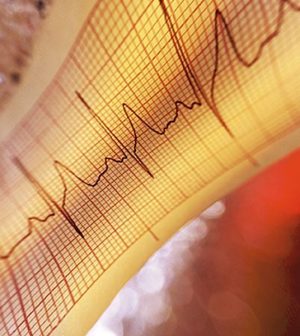- Could Your Grocery Store Meat Be Causing Recurring UTIs?
- Are You Making This Expensive Thermostat Error This Winter?
- Recognizing the Signs of Hypothyroidism
- 10 Strategies to Overcome Insomnia
- Could Artificial Sweeteners Be Aging the Brain Faster?
- Techniques for Soothing Your Nervous System
- Does the Water in Your House Smell Funny? Here’s Why
- Can a Daily Dose of Apple Cider Vinegar Actually Aid Weight Loss?
- 6 Health Beverages That Can Actually Spike Your Blood Sugar
- Treatment Options for Social Anxiety Disorder
COVID Can Raise Long-Term Odds for Irregular Heartbeat

Add another post-COVID hazard to the list: Research suggests having the illness could raise risks for dangerous irregular heart beats.
According to Swedish researchers, the odds a person might develop atrial fibrillation — a common arrhythmia linked to stroke — rose 12-fold in the month after a COVID infection, compared to folks without the illness. The risk remained elevated for at least two months, they added.
Age and COVID severity appeared to be key.
“We found that the risks were higher in older individuals, individuals with severe COVID-19 and during the first wave of the pandemic,” said researcher Dr. Anne-Marie Fors Connolly. She leads the research group at Umeå University.
“We could also see that unvaccinated people were at higher risk than vaccinated people,” she added in a university news release. “Overall, the severity of the infection was the strongest risk factor.”
In their study, Connolly and colleagues analyzed data on over 1 million Swedes who became infected with COVID up until May of 2021.
They compared health data from those individuals to that of 4 million Swedes who hadn’t become infected with COVID.
Besides the sharply raised risk for atrial fibrillation, the team also discovered that having had a bout of COVID-19 raised the odds for another dangerous arrhythmia, paroxysmal supraventricular tachycardia, for six months.
There was a also five-fold higher risk of developing this irregular heart beat within a month of infection with the COVID virus, the research showed.
Risks for another class of irregular heart beat, called bradyarrhythmias, tripled in the month after COVID, the study also found.
All of these findings “underline the importance of both being vaccinated against COVID-19 and that the healthcare system identifies people at increased risk of this type of complications, so that the correct diagnosis is made and appropriate treatment is started in time,” said study first author Dr. Ioannis Katsoularis, a cardiologist at University Hospital of Northern Sweden in Umeå.
The study was published recently in the European Heart Journal.
More information
Find out more about heart arrhythmias at the Mayo Clinic.
SOURCE: Umeå University, news release, Dec. 13, 2023
Source: HealthDay
Copyright © 2026 HealthDay. All rights reserved.










